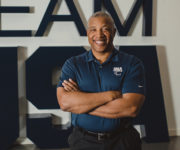Meet the Match
A Ugandan Paralympic Leader Builds a Movement
Mpindi Bumali always knew, for better or worse that he’d stand out.
Born in the large town of Masaka in central Uganda, he was one of two children in his family to contract polio as a toddler. Living with a disability in his community was far from easy. The children would tease him, and neighbors would accuse the family of being cursed by witchcraft.
“They would say, ‘How can polio affect two people in the same family?’” Mpindi recalls. “In the school and classrooms, teachers and classmates would say, ‘Don’t touch my pen or books,’ and make me sit alone. Apart from my family, no one accommodated us.”
Unrelenting, Mpindi turned his focus to academics and the arts, becoming not only one of the top students in his class but also very involved in music, dancing and drama at school. He represented the school in competitions and it helped him to feel accepted by the community.
As he got older, Mpindi continued excelling in school. In 2006, he earned his bachelor’s degree in social works and social administration from Nkumba University. By this time, he became involved in the disability movement. He began by volunteering for Uganda National Action on Physical Disability, an organization that was using sport as a tool for empowerment, and soon after started powerlifting and sitting volleyball.
In 2010, Mpindi began working with the sitting volleyball association and helped a team of women qualify for the world championships in Oklahoma. Unfortunately, the national team couldn’t attend because of a lack of financing and support from the government.
“The government didn’t understand anything about Paralympic sports,” Mpindi says. “But, other associations were impressed. The National Paralympic Committee was stagnant—there were no fees, no office space, no growth. The people wanted a change in leadership. They started pushing me to stand as president.”
Later that same year, Mpindi was elected unopposed as president, and continues to serve in that role. Over the years, he has also accumulated other positions of influence, serving as the secretary general for the Federation of East Africa Sports for People with Disabilities, and a governing board member of the Africa Paralympic Committee.
From his first day as president, Mpindi began organizing campaigns to sensitize the public to disability and mobilize people with disabilities to take part in sports. He began advocating to government about a policy that would include special needs components to P.E. classes in school, and worked with Uganda’s Ministry of Sports to include para sports in the local and national school sports competitions it organized. He also began a collaboration with Makarere University to use its accessible facilities for Paralympic athletes to train.
Mpindi’s most recent success came in partnership with the Uganda Olympic Committee, where the two committees lobbied the government to provide stipends to medal-winning athletes in international competitions.
“This achievement has changed lives of people with disabilities and has provided a source of employment,” Mpindi says. “It has restored hope and encouraged many people with disabilities to engage in sports.”
With extensive challenges affecting most areas of life for people with disabilities in Uganda, Mpindi sees sports as providing a key avenue for acquiring income that people can establish businesses and succeed away from the field. In other ways, sport has provided confidence to athletes, and this confidence then manifests itself as they lobby for their rights to education, healthcare and employment.
According to government statistics, approximately 12 percent of Ugandans, or 5.3 million, have disabilities. This population is spread across a large and mostly inaccessible country with 121 districts. Those who have disabilities must be creative and determined to thrive, as there are meager resources available to support this population, significant social discrimination, and a lack of access to quality assistive equipment, including wheelchairs.
Through his various positions, Mpindi wants to continue pushing the government to fulfill its constitutional and legal obligation to people with disabilities. He would like to work closely with the International Paralympic Committee and other development partners to run programs that can further grow the adaptive sports movement in Uganda and include more people.
“Sport is becoming a serious tool to address quite a number of issues,” Mpindi says. “It is not only in sports that we see an impact. We are addressing issues of gender and human rights. We are removing barriers that prevent inclusion. We’re continuing to advocate for different things that need changing in our society.”
As part of his participation in the U.S. Department of State Global Sports Mentoring Program, Mpindi partnered with John Register, a Paralympic medalist, prominent speaker, and associate director of community and veterans programs for the U.S. Olympic Committee. With nearly two decades in the Paralympic movement, John provided key insights for Mpindi in the areas of advocacy, collaboration with government and Paralympic partners, and how he can utilize media channels as tools for expanding the movement. Conversely, Mpindi provided a uniquely Ugandan perspective to how para sports are growing and impacting societies across Africa, as they seek to follow the U.S. example into long-term sustainability and success.

